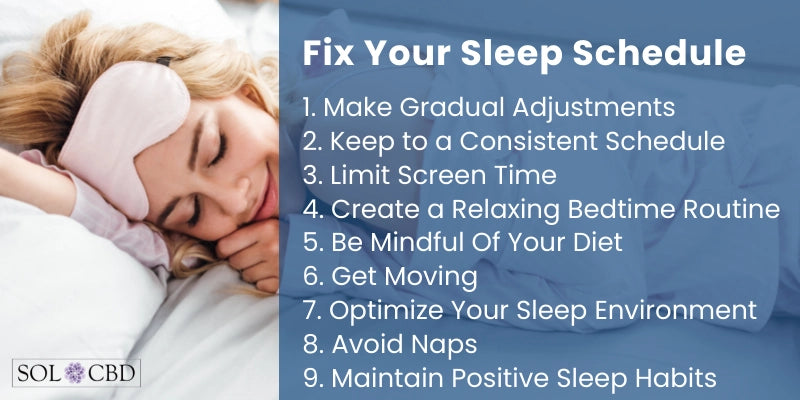However, modern challenges like late work, screens, and midnight snacks disrupt our sleep. But with the right strategies, you can regain control. In this guide, we'll explore tips to reset your sleep schedule, ensuring restful nights and a healthier, more vibrant life. Say goodbye to sleepless nights and hello to rejuvenating slumber.
Table of Contents
- Why Resetting Your Sleep Schedule Matters
- Why Do Sleep Schedules Get Off Track?
- Understanding Your Current Sleep Habits
- How to Fix Your Sleep Schedule
- When To Seek Professional Help for Your Sleep Routine
- Conclusion:
- FAQ's
Why Resetting Your Sleep Schedule Matters
Sleep is not merely a luxury; it's a fundamental necessity for our physical and mental well-being. Let's dive into why maintaining a healthy sleep schedule is of paramount importance.
Impact on Overall Health and Well-being
Imagine your body as a factory, tirelessly working to manufacture essential products for your well-being. Sleep is the night shift, the crucial period when this factory undertakes vital maintenance and repair work.
-
Physical Restoration: During sleep, your body heals and regenerates. Tissues are repaired, muscles rebuild, and your immune system strengthens. Adequate sleep is your body's way of ensuring it can face the challenges of a new day at its best.
-
Cognitive Function: Sleep isn't just about resting your body; it's equally essential for your mind. It's during sleep that your brain consolidates memories, enhances problem-solving skills, and clears out toxins that accumulate during the day. In short, it's your mental tune-up.
-
Emotional Balance: A lack of sleep can wreak havoc on your emotions. Irritability, mood swings, and increased stress levels are often the consequences of sleep deprivation. Maintaining a regular sleep schedule can help keep these emotions in check.
-
Metabolic Health: Believe it or not, sleep plays a pivotal role in weight management. Irregular sleep patterns can disrupt the hormones that regulate appetite, potentially leading to weight gain.

The Role of the Circadian Rhythm
Now, let's shine a light on the conductor of this symphony of sleep—your circadian rhythm. Think of it as your body's internal clock, a complex system that governs when you feel alert and when you naturally become drowsy.
-
Daily Rhythms: Your circadian rhythm is programmed to follow a 24-hour cycle. It's responsible for those times when you feel a surge of energy during the day and the gradual winding down in the evening.
-
External Influences: While your internal clock is largely influenced by factors like genetics, it can also be influenced by external cues, most notably light. Exposure to natural light during the day and darkness at night helps synchronize your circadian rhythm.
-
Sleep-Wake Cycles: Your circadian rhythm plays a pivotal role in regulating your sleep-wake cycles. When it's in sync with your desired sleep schedule, falling asleep and waking up becomes more natural and refreshing.
In essence, resetting your sleep schedule is about aligning your external habits and routines with this internal conductor. When the two work in harmony, your sleep becomes more restorative, your days more energized, and your overall health and well-being benefit immensely. In the following sections, we'll explore strategies to help you regain this harmony and master your sleep schedule.

Why Do Sleep Schedules Get Off Track?
Our sleep schedules can get off track due to various factors, often stemming from the demands and distractions of modern life. Here are some common reasons:
-
Work and Social Commitments: Irregular work hours, shift work, or social obligations can disrupt your natural sleep schedule, making it challenging to maintain consistency.
-
Jet Lag: Traveling across time zones can throw your internal body clock out of sync, leading to temporary sleep schedule disruptions.
-
Stress and Anxiety: Worries and anxieties about work, relationships, or life, in general, can keep your mind active and prevent you from falling asleep or staying asleep.
-
Diet and Caffeine: Consuming heavy meals or caffeine late in the evening can disrupt sleep patterns and make it harder to fall asleep.
-
Environmental Factors: Noise, light, and an uncomfortable bed can interfere with your ability to maintain a regular sleep schedule.
-
Medical Conditions: Certain medical conditions, such as sleep disorders (e.g., insomnia, sleep apnea) or chronic pain, can disrupt your sleep.
-
Medications: Some medications have side effects that affect sleep, leading to changes in your sleep schedule.
Recognizing these factors and addressing them with appropriate strategies and lifestyle adjustments can help you get your sleep schedule back on track and enjoy the benefits of restorative slumber.

Understanding Your Current Sleep Habits
Before embarking on the journey to reset your sleep schedule, it's crucial to gain insight into your current quality This understanding will serve as the foundation for the adjustments you'll make to improve your sleep schedule. Let's explore how to decode your sleep habits effectively.
Keep a Sleep Journal
One of the most effective ways to understand your current sleep pattern is to keep a sleep journal for at least a week. Here's how to do it:
-
Record Bedtime and Wake-up Time: Note down the exact time you go to bed and when you wake up in the morning.
-
Quality of Sleep: Rate the quality of your sleep on a scale of 1 to 10, with 10 being the best. Consider factors like how easily you fall asleep, how many times you wake up during the night, and how refreshed you feel in the morning.
-
Nap Times: Sleep during the day? Record any daytime naps you take, including their duration.
-
Daily Activities: Document your daily activities, especially those close to bedtime. This includes meals, exercise, screen time, and any stressful events.
-
Sleep Environment: Note the conditions in your sleep environment, such as room temperature, lighting, and noise levels.
Identify Patterns and Trends
Once you've collected this data, you can start identifying patterns and trends:
-
Consistency: Look for patterns in your bedtime and wake-up times. Are they consistent from day to day, or do they vary widely?
-
Sleep Quality: Assess the quality of your sleep. Are there specific nights when you sleep better or worse? Are there any common factors contributing to poor sleep quality?
-
Naps: Examine your nap habits. Are you taking long naps close to bedtime that might interfere with your nighttime sleep?
-
Daily Activities: Analyze how your daily activities might be affecting your sleep. Are you consuming caffeine or heavy meals late in the evening? Are you engaging in vigorous exercise too close to bedtime?
-
Sleep Hygiene Consider the conditions in your sleep environment. Is your bedroom conducive to restful sleep, or are there factors that might be disrupting it?

Seek Professional Help If Needed
If, during this self-assessment, you discover persistent and severe sleep issues, it's advisable to consult a healthcare provider or a sleep specialist. They can help identify any underlying sleep disorders or medical conditions that may be affecting your sleep.
Understanding your current sleep pattern is the first step towards resetting your sleep schedule successfully. Armed with this knowledge, you can make informed decisions and implement the strategies necessary to achieve better sleep and improved overall well-being. In the following sections, we'll delve into practical tips to help you reset your sleep schedule and create a healthy sleep routine.
Related: CBD Sleep Study: Can You Improve Your Sleep With CBD?
How to Fix Your Sleep Schedule
Ready to take action? We've got you covered. Discover practical tips for resetting your sleep schedule, whether you need to adjust it gradually or make a dramatic change.
1. Make Gradual Adjustments
Gradual adjustments to your sleep schedule can be a game-changer when it comes to resetting your internal body clock. Instead of making abrupt changes, consider shifting your bedtime and wake-up time by 15 to 30 minutes earlier or later each day, depending on your goal. Here's why this approach works:
-
Reduced Sleep Disruption: Your body doesn't appreciate sudden disruptions to its routine. Gradual adjustments are gentler, allowing your circadian rhythm to adapt without shock. This can result in fewer sleep disturbances and a smoother transition.
-
Improved Compliance: Making small changes is more manageable and sustainable. It's easier to stick to a new schedule when it doesn't feel like a drastic shift.
-
Long-Term Success: The gradual approach promotes long-term success. It's about training your body to embrace a new rhythm, not forcing it into submission.
2. Keep to a Consistent Schedule
Consistency is the cornerstone of a healthy sleep schedule. When you prioritize going to bed and waking up at the same times every day, you're sending a powerful message to your internal clock:
-
Regulated Internal Clock: Your circadian rhythm thrives on predictability. When you maintain a consistent sleep schedule, your body knows when to release sleep-inducing hormones and when to wake up, promoting a more regular sleep-wake cycle.
-
Improved Sleep Quality: A consistent schedule helps improve sleep quality by ensuring you get the right amount of sleep for your body's needs.
-
Enhanced Alertness: When you wake up at the same time daily, you'll find yourself feeling more alert and refreshed in the morning. Your body adapts to this routine, optimizing its energy levels accordingly.
3. Limit Screen Time
The screens we're surrounded by emit blue light, which can wreak havoc on our sleep:
-
Blue Light Effects: Blue light suppresses melatonin production, making it harder to fall asleep. It also tricks your brain into thinking it's daytime, disrupting your circadian rhythm.
-
Practical Tips: To reduce the impact of screens, consider creating a technology-free zone in your bedroom. Wind down by reading a physical book or practicing relaxation techniques. If you must use screens, use blue light filters or special glasses designed to block out blue light.
4. Create a Relaxing Bedtime Routine
A bedtime routine is like a lullaby for your body and mind:
-
Calming Activities: Engage in calming activities before bed, such as reading a book, taking a warm bath, or practicing deep breathing exercises. These activities signal to your body that it's time to wind down.
-
Consistency Matters: The key is consistency. Repeating these calming rituals each night helps establish a bedtime routine that becomes a cue for your body to prepare for sleep.
5. Be Mindful Of Your Diet
What you eat and when you eat can have a profound impact on your sleep:
-
Heavy Meals: Avoid heavy, rich, or spicy meals close to bedtime. These can lead to discomfort and indigestion, making it challenging to fall asleep.
-
Caffeine: Limit caffeine intake in the afternoon and evening. Caffeine is a stimulant that can interfere with your ability to fall asleep and stay asleep.
6. Get Moving
Regular physical activity can be a sleep-enhancing powerhouse:
-
Promoting Better Sleep: Exercise helps you fall asleep faster and enjoy deeper sleep. Aim for at least 30 minutes of moderate aerobic exercise most days of the week.
-
Timing Matters: While exercise is generally beneficial, avoid vigorous workouts close to bedtime, as they can be too stimulating. Aim to finish exercising at least a few hours before bedtime.
7. Optimize Your Sleep Environment
Your sleep environment plays a crucial role in the quality of your sleep:
-
Ideal Conditions: Create a sleep-conducive environment that's dark, quiet, and comfortable. Invest in blackout curtains, earplugs, or a white noise machine if necessary.
-
Temperature Control: Keep your bedroom at a comfortable temperature, typically on the cooler side, as a cooler room can promote better sleep.
8. Avoid Naps
Naps can be a double-edged sword:
-
Role of Naps: Short, well-timed naps can be rejuvenating, but long or late-afternoon naps can disrupt your nighttime sleep.
-
Guidelines: If you need a nap, aim for 20-30 minutes and try to take it earlier in the day to avoid interfering with your nighttime sleep.
9. Maintain Positive Sleep Habits
The psychological aspect of sleep is just as crucial:
-
Worry and Sleep: Worry and stress can hinder sleep. Try relaxation techniques, such as meditation or progressive muscle relaxation, to calm your mind before bedtime.
-
Mindset Matters: Cultivate a positive mindset about sleep. Recognize that sleep is essential for your well-being and productivity, and embrace it as a time for rejuvenation.

10. Try Natural Supplements
When seeking additional support for improving your sleep schedule and quality, consider the benefits of natural supplements like CBD (Cannabidiol), CBN (Cannabinol), and melatonin softgels. What sets these options apart is their non-habit-forming and non-addictive nature, making them a safe and effective choice for enhancing your sleep routine.
-
CBD: Cannabidiol (CBD) is a well-known cannabinoid derived from the cannabis plant. It has gained recognition for its potential to promote relaxation, reduce anxiety, and support better sleep. Importantly, CBD does not produce a "high" and is non-addictive.
-
CBN: CBN is another cannabinoid found in cannabis that has shown promise in aiding sleep. It may help reduce insomnia symptoms, ease restlessness, and provide a sense of calm before bedtime. Like CBD, CBN is non-habit-forming and safe to use.
-
Melatonin: Melatonin is a hormone naturally produced by the pineal gland in response to darkness, signaling the body that it's time to sleep. Supplementing with melatonin can be particularly helpful for managing sleep disruptions caused by jet lag or shift work, and it is also non-habit-forming.
These natural supplements work with your body's existing mechanisms to promote restorative slumber, making them a safe and non-addictive option for those looking to optimize their sleep routine. Consult with a healthcare provider to determine the right dosage and timing for your specific needs.
Related: Sleep Gummies Demystified: Is my CBD gummy a sleep aid?
When To Seek Professional Help for Your Sleep Routine
Seeking professional help for sleep issues is a wise decision when your sleep problems persist or significantly impact your quality of life. Here are some indicators of when it's time to consult a healthcare provider or a sleep specialist:
-
Chronic Sleeplessness: If you've been experiencing consistent difficulty falling asleep or staying asleep for several weeks, it's a sign to seek help.
-
Excessive Daytime Sleepiness: If you frequently feel excessively tired or drowsy during the day, regardless of how much you sleep at night, it may be indicative of an underlying sleep disorder.
-
Loud Snoring and Breathing Pauses: If you or your partner notice loud snoring accompanied by periods of interrupted breathing during sleep, it could be a sign of sleep apnea, a serious sleep disorder.
-
Restless Legs Syndrome: If you experience uncomfortable sensations in your legs, often accompanied by an irresistible urge to move them, especially when lying down or trying to sleep, it's essential to consult a healthcare provider.
-
Frequent Nightmares or Night Terrors: Persistent and disturbing nighttime dreams or night terrors can disrupt your sleep and may be indicative of an underlying issue.
-
Sleepwalking or Other Parasomnias: Engaging in unusual behaviors during sleep, such as sleepwalking, sleep talking, or night sweats, should be discussed with a healthcare professional.
-
Changes in Sleep Patterns with Aging: As we age, our sleep patterns can change, but significant disruptions should not be ignored, especially if they affect overall health and well-being.
-
Shift Work or Circadian Rhythm Disorders: If you work irregular hours or experience difficulties adjusting to a shift work schedule, a sleep specialist can provide guidance.
-
Medication or Substance-Related Sleep Issues: Some medications or substances can impact sleep. If you suspect this is the case, consult with a healthcare provider for adjustments or alternatives.
-
Persistent Insomnia: If you have persistent insomnia, characterized by difficulty falling or staying asleep, despite trying various self-help strategies, a professional evaluation is warranted.
-
Daytime Impairment: If your sleep issues result in impaired daytime functioning, affecting your performance at work, relationships, or daily activities, it's time to seek help.
-
Medical Conditions: If you have underlying medical conditions like depression, anxiety, or chronic pain that are significantly affecting your sleep, a healthcare provider can offer guidance on managing both the medical condition and sleep problems.

Remember that professional help is available, and discussing your sleep concerns with a healthcare provider or sleep specialist can lead to an accurate diagnosis and effective treatment options tailored to your specific needs. Don't hesitate to seek assistance when sleep issues persist or negatively impact your life.
Conclusion:
In this comprehensive guide, we've explored the ins and outs of resetting your sleep schedule. From understanding the importance of a consistent sleep routine to tackling shift work and sleep disorders, you now have the knowledge to take control of your sleep.
Remember, the road to a better sleep schedule may take time and patience, but the benefits are well worth the effort. By implementing the tips and strategies discussed in this article, you can enjoy healthier, more restful nights and wake up feeling refreshed.
So, bid farewell to those sleepless nights and embark on a journey toward a more balanced and fulfilling sleep schedule. Your body and mind will thank you for it.
FAQ's
What are the recommended hours of sleep I need each night?
Most adults need 7-9 hours of quality sleep per night for optimal health and well-being. However, individual sleep needs can vary.
What is a "delayed sleep phase," and how does it affect my sleep schedule?
Delayed sleep phase syndrome is when your natural sleep-wake cycle is shifted to later hours, making it difficult to fall asleep and wake up at desired times. It can be managed with strategic changes to your routine.
What are some practical tips for adjusting my sleep schedule when it's been disrupted?
Practical tips include avoiding screens before bedtime, limiting caffeine and heavy meals in the evening, and engaging in relaxing bedtime rituals like reading or deep breathing exercises.
How do I practice good sleep hygiene to ensure quality sleep?
Good sleep hygiene involves creating a sleep-conducive environment, maintaining a regular sleep schedule, and avoiding stimulating activities close to bedtime.
Why is it essential to keep a regular sleep schedule?
A regular sleep schedule helps regulate your circadian rhythm, ensuring that your body knows when it's time to sleep and wake up. It promotes better sleep quality and overall well-being.
What can I do if I find it challenging to go to sleep earlier than my usual bedtime?
Gradually adjust your bedtime earlier in small increments, expose yourself to natural light in the morning, and avoid stimulating activities in the evening to make falling asleep earlier more manageable.
How does exposure to natural light during the day affect my sleep cycle?
Exposure to natural light during the day helps synchronize your circadian rhythm, making it easier to wake up in the morning and promoting alertness during the day.
How can I ensure that my sleep schedule doesn't get "out of whack" due to lifestyle changes, travel, or pulling an all-nighter?
Maintain a consistent sleep schedule, even during weekends or vacations, and use strategies like exposure to natural light and gradual adjustments to prevent disruptions.
Are there any recommended sleep schedule practices from organizations like the American Academy of Sleep Medicine?
The American Academy of Sleep Medicine recommends maintaining a regular sleep schedule, practicing good sleep hygiene habits, and seeking professional help if sleep problems persist.





























